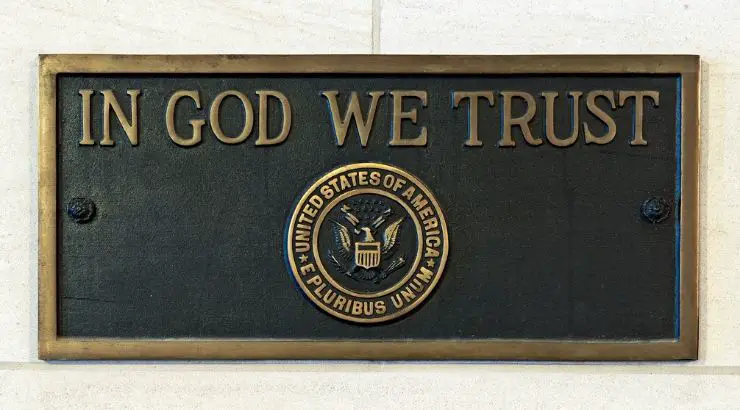Politics
South Dakota to Require ‘In God We Trust’ Signs at Every Public School to “Inspire Patriotism”
Critics are condemning the law as part of a “stealth campaign” aiming to infuse religious indoctrination into state legislation.

(TMU) — In the latest move to undermine the separation of church and state in the United States, a new law in South Dakota is requiring all public schools in the state to prominently display the motto “In God We Trust.”
The new law, which decrees that schools must emblazon the message across 149 South Dakota school districts, was pushed by lawmakers who argue that the theological slogan is meant to “inspire patriotism.”
Governor Kristi Noem signed off on the law in March. The law requires that the motto must be both legible and 12-by-12 inches in size.
In a Thursday Twitter post, the governor said:
“We should never be afraid to proclaim that we are one nation under God. Thanks to a new law, ‘In God We Trust’ will be a part of South Dakota schools this upcoming school year as a humbling reminder of our country’s faith tradition.”
https://twitter.com/KristiNoem/status/1154473914388627456
According to CBS News, Associated School Boards of South Dakota said that “Some [schools] have plaques, others have it painted on the wall, maybe in a mural setting,” while in one school “it was within their freedom wall. They added that to a patriotic theme.”
The new law has provoked controversy in many of the state’s communities, with critics condemning the law as part of a “stealth campaign” aiming to infuse religious indoctrination into state legislation.
Wisconsin-based nonprofit organization Freedom From Religion Foundation (FFRF) damned the law as exclusionary. In a press release, the group said:
“The law—insultingly confusing patriotism with piety—is part of the nationwide legislative push by Project Blitz, which is a stealth campaign to inject religious bills into state legislatures across the country … These laws are about advancing the Big Lie that the United States was ‘founded on God’ or Christianity, thus dismantling the wall between religion and government. The motto ‘In God We Trust’ is inaccurate, exclusionary, and aimed at brainwashing American schoolchildren into believing that our nation is a theocracy, FFRF asserts.”
The Freedom From Religion Foundation is damning an exclusionary new South Dakota law that mandates displaying an “In God We Trust” logo in all public schools. https://t.co/tQ4XQEXut5 pic.twitter.com/UKpAAO0D0q
— FFRF (@FFRF) July 25, 2019
Six other states—Alabama, Arizona, Arkansas, Florida, Louisiana and Tennessee—have also approved legislation that allows or enforces the posting of the religious motto on public school grounds.
This summer at Stevens High School in Rapid City, South Dakota, a group of students held a brief campaign to pressure their school board to alternate God with Yahweh, Allah, Buddah, and other terms including “science” and “ourselves” in a bid to use a more inclusive message.
Their school board ignored the students’ request and reportedly declined to consult with the group, according to a student who spoke to secular blogger The Friendly Atheist.
Stevens High student Abigail Ryan told KOTA-TV:
“I think that’s a really foundational element of American society, is that we are a cultural melting pot and it is really important that we make all people who come to America to feel welcome and to be more in accordance with the First Amendment since we all have the freedom of religion.”
The slogan “In God We Trust” began appearing on U.S. coins following an upswing in religious fervor following the Civil War, according to the U.S. Treasury Department. In 1956, at the height of conservative religiosity during the first decade of the Cold War, it was signed into law as the official U.S. motto by President Dwight Eisenhower.
The original U.S. motto, chosen by founding statesmen Thomas Jefferson, Benjamin Franklin, and John Adams, was the Latin phrase E Pluribus Unum, which means “From Many, [Come] One.”
By Elias Marat | Creative Commons | TheMindUnleashed.com
Typos, corrections and/or news tips? Email us at Contact@TheMindUnleashed.com
